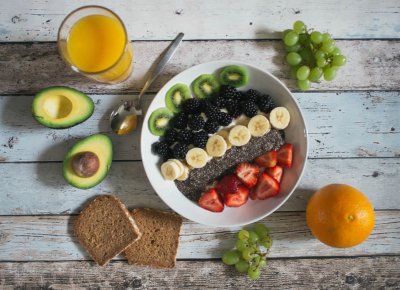Why did I become a clinical nutritionist?
Today I want to write about why I believe nutrition is one of the best allies we have at our disposal to become happier and more balanced. I used to be the type of person who felt like the type of calories did not matter. I was skeptical about diets (I still am!). I used to think that my genes were responsible for all my health issues, which were invisible to the naked eye. When someone is slender, it is automatically assumed that such a person is healthy. That assumption could be very far from the truth. I have known plenty of people whose weight is within the considered healthy parameters, yet they are not healthy.
When I finished my master’s degree in library science at UCLA, I wanted to go back to school to study something different – I was thinking of business, but that did not appeal to me enough, so that idea was idle for a long time. I waited a few years and was blessed with working with residents in a newly ACGME accredited program. I jumped into the opportunity because I thought working with residents would help me change the future of healthcare. While working there, the job’s demands were not that favorable, even though I loved my residents. After almost four years, the commute was strenuous; I found a position closer to home.

By the time I started working at my new job, my health had deteriorated rapidly, and I was getting no answers anywhere. I had visited many specialists, and their responses were always inconclusive. However, my new primary care physician gave me a questionnaire. Based on a few answers on a paper, I was diagnosed with fibromyalgia.
When I went back to my office after my doctor’s visit, a co-worker, seeing me all distressed, asked me what was wrong. When I told her, she said my sister is following a diet, I am not sure what it is, but it works for her. I asked her to find me the author’s name and the book’s title. It is a guy, I can’t remember his name, but he has a book. I will let you know, she said. She did give me the name of the book. I looked him up, and I fell in love with the pillars he based his recommendations. When I looked him up, I saw vegetables and fruits, herbs and spirituality. That was the message that came across. For some reason, that resonated with me, and I kept on reading. It was May of 2018, and my life has changed since then. My health has improved, and I am now a nutritionist trying to teach others what to do when all doors seem closed. May is mental health awareness, and I wanted to say to those who feel weighed down by the stress that signs and symptoms bring to anyone’s life: there are ways to manage, improve and get better. There is hope. There are answers. Don’t despair.
Nutrition imbalances might be related to how you feel and even how you think. There are many ways to restore your body’s balance and add happiness to your life. It takes effort, and you need to be willing to make changes. Only you know if you are ready to start.
But when you are ready, know that people out there care and will help you overcome your nutritional imbalances. My journey was lonely with lots of trials and errors; yours doesn’t have to be. Eating well is an effort for some of us. Knowing what to eat can also be challenging. Much of the way we relate to food has to do with behaviors that we observed or lived in our childhood.
A clinical nutritionist is an expert that can help you make the changes and create new habits, including lifestyle modifications that will benefit you in the long run.



Clinical nutritionists look at the root cause of the problem. We don’t work alone, and sometimes referring clients out is needed. But we can address several issues that might be a mystery altogether. Let a clinical nutritionist be a detective and give you the tools to empower yourself nutritionally.
Recent posts
-

The Affordable Care Act and MNT Coverage
1 de June de 2024 at 11:30
-

The Healing Power of Nutrition: How Diet Can Help You Feel Better
1 de June de 2024 at 11:13
-

The Power of Nutritionists: Transforming Lives Through Personalized Nutritional Changes
1 de June de 2024 at 10:50
-

What is a healthy thyroid diet?
27 de December de 2023 at 17:24
-

Are nutritionists legit?
27 de December de 2023 at 17:21
-

Grave’s Disease
27 de December de 2023 at 17:17
-

What’s my offer?
27 de December de 2023 at 17:11
-

Feeling like eating a slice of cake, but you want to avoid flour?
27 de December de 2023 at 17:06


Leave a reply